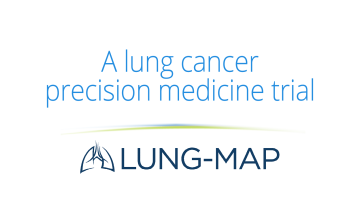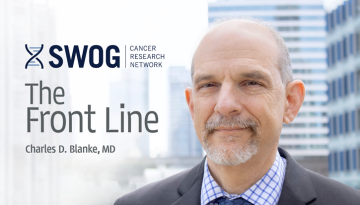The Power of SWOG Pays Off
I have always been amazed by how much the teaching of medical skills runs on an apprenticeship model. Taking it one step further, mentors build the next generation of researchers by passing down advice, making introductions, answering questions, reviewing proposals and generally providing strong and long-lasting support to young investigators as they build their careers.
In oncology, this model not only works – it regularly leads to spectacular results. Which is what happened last week, when Dr. Monty Pal presented results of S1500 at the ASCO 2021 Genitourinary Cancers Symposium, which were simultaneously published in The Lancet. Pal and his team immediately changed the standard of care for metastatic papillary kidney cancer, showing that the MET inhibitor cabozantinib was the most effective for patients with this rare form of kidney cancer. (For the full details, read our press release here and see the publication here).
This SWOG trial generated lots of news stories and celebratory tweets, and it’s generating a lot of pride for me. The story of Monty Pal and S1500 is a SWOG success story, illustrating our unique value by supporting the next generation – and pursuing scientifically important trials.
The story started in 2009, when Monty was a fellow at City of Hope, with dreams of building a career in kidney cancer. He hoped to rely on Dr. Bob Figlin for guidance, but Figlin left for Cedars-Sinai. Dr. Joanne Mortimer, a long-time SWOG member and breast expert at City of Hope, suggested he join SWOG. He’d be able to find plenty of kidney cancer mentors here.
The rest is history.
Monty had the good fortune to land in our productive, progressive GU committee, and Drs. Nick Vozelgang and Ian Thompson took him under their wing. So did our deputy chair, Dr. Primo “Lucky” Lara, who was the kidney cancer lead on that team.
Lucky knew Monty from work together in the NCI’s Experimental Therapeutics Clinical Trials Network, and became his mentor, supporting his 2011 application to The Hope Foundation for Cancer Research’s Young Investigator Training Course and eventually working with him on the concept for S1500. Lucky helped with the NCI negotiations – which were tough. S1500 was a phase II trial, and focused on a rare cancer. It was not a slam-dunk! But SWOG had paved the way in papillary kidney cancer trials with S0317 and S1107, and the concept made it through NCI review.
“At that point, SWOG had really cornered the market in papillary, so Monty was standing on the shoulders of giants,” Lucky says. “And really, he has always been primed for success. He’s a real go-getter. He’s motivated and self-aware and clear about his goals.”
Fast-forward five years from the S1500 launch, and Lucky is senior author on The Lancet paper. Ian Thompson is also on the author list.
Monty said SWOG has been key to his success. Not only did he get mentors and money here – including a Coltman Fellowship award from Hope – he found Dr. Neeraj Agarwal, one of his closest personal and professional friends. He definitely found the kidney cancer research career that he was looking for as a fellow.
“Academic medicine can feel lonely, but SWOG brings you together with some of the best experts in your field to work on trials,” he said. “You can do studies at SWOG where you have a big impact on the design and also get substantial peer review. The science is extremely well-vetted. And you can study a rare cancer treatment because SWOG can enroll patients through a national network. You literally have the power to do great work here.”
Hats off to Monty – and to all our SWOG research mentors. Our dedication to young investigators is one of the group attributes that I admire most.
Other Recent Stories



